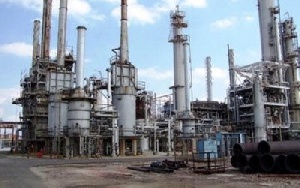The Association of Liquefied Petroleum Gas (LPG) Truck Drivers is blaming the high propane content in gas from Atuabo as the cause of recent gas explosions during discharge at filling stations in the country.
According to them, because of the high propane content in the LPG, the pressure of gas from Atuabo processing plant is far higher than imported LPG, which destroys vital components in the trucks and at the filling stations, resulting in leakages and the resultant fires.
Ghana’s LPG standard
In Ghana, imported LPG is a mixture of 20% propane and 80% butane.
Atuabo gas: high propane level
According to information from industry players, the propane level in gas from Atuabo ranges between 50% and 70% while butane constitutes the remaining depending on the blend for the consignment. Industry players say government must pay attention to the concerns raised about gas from Atuabo.
Speaking to The Finder, Shafiu Mohammed, Chairman of LPG Truck Drivers Association, said high pressure due to high propane content destroys their discharging pumps and hoses when they load gas from Atuabo. In addition, he said, safety valves on the trucks are easily destroyed by the pressure of gas from Atuabo.
Atuabo has no smell
He also revealed that the gas from the Atuabo processing plant does not have the odour of LPG, which, he said, poses danger to users, explaining that in the event of leakage at homes, users of Atuabo gas cannot really smell it.
NPA aware of the challenges
According to him, when they identified those dangerous developments, which other industry players have confirmed, they reported to the immediate-past management of National Petroleum Authority (NPA).
Blending of Atuabo LPG stopped
Mohammed told The Finder that when production started at Atuabo, imported LPG was being lifted from Tema to blend with gas from Atuabo to give it the LPG smell, as well as reduce the propane content before selling to stations.
However, he revealed that the practice was stopped when management of Atuabo Gas said it had procured machines to do the blending.
Atuabo gas poses danger to domestic users
But despite the procurement of the machines, gas from Atuabo is still without that peculiar odour, posing danger to domestic consumers.
Gas from Atuabo involved in Dansoman and Atomic Junction explosions
Chairman of LPG Truck Drivers Association explained that the gas explosions at Dansoman and Atomic Junction were all caused by gas from Atuabo.
Trade Fair/Takoradi explosions
The explosions at the Trade Fair site and Takoradi were caused by imported gas, but it has almost the same chemistry like Atuabo gas, and Mohammed says that confirms their position that the high propane level was responsible for gas explosions in the country.
Gas explosions may not stop
Mohammed is convinced that until the propane levels in gas from Atuabo is reduced to the Ghana standard of around 20%, gas explosions are likely to happen again.
High butane LPG content less likely to cause fire
He explained that LPG with high butane content is less likely to cause explosions because during leakage, the gas gets frosted to form an ice-like content due to the high liquid levels.
High butane LPG content frosts
Consequently, he said the LPG is unable to move around to look for naked fire to cause explosion. He added that when personnel from Fire Service arrive, they spray their chemicals on the ice-like gas for it to melt away without causing fire.
High propane LPG content highly likely to cause fire
However, Mohammed said high propane cannot get frosted and, therefore, the gas moves in the air, and as soon as it comes into contact with naked fire, it leads to an explosion.
The Ghana National Gas Company and NPA could not be reached for comments.
General News of Monday, 16 October 2017
Source: thefinderonline.com
Drivers blame Atuabo gas for Atomic Junction explosion
Entertainment

What Bullgod said about going to prison for the NDC
Opinions










